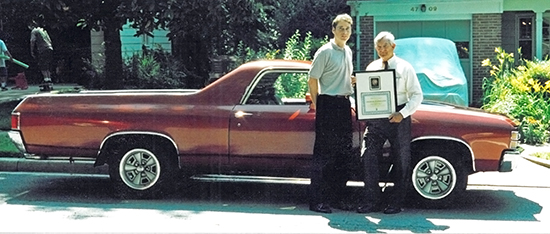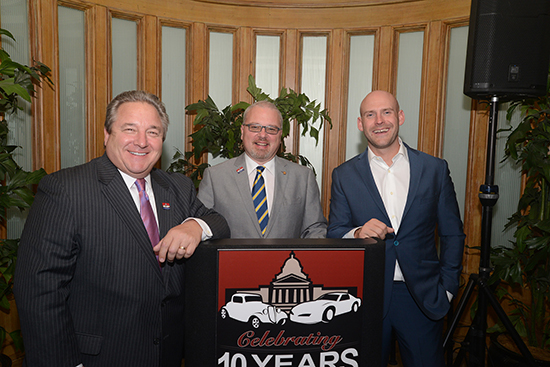*The third part of the SAN’s 20th Anniversary series, continued from the Summer 2017 issue of Driving Force.
 |
|
| In 2000, the SAN awarded Virginia Delegate Jim Dillard (right) with a certificate of appreciation for his leadership in enacting pro-hobby legislation. He is pictured here with SEMA’s Steve McDonald. | |
|
|
It didn’t take long for the SAN to begin seeing a transition away from fighting the government to proactively creating mutually beneficial relationships with lawmakers and regulators. As unresolved legislative issues were discovered throughout the auto hobby, fair solutions were pursued. With the ever-growing popularity of street rods and customs—especially the replica and kit car varieties—the need for unique licensing designations became critical. Modified vintage and reproduction vehicles did not fall under existing state classifications for decades. In many states, outdated and convoluted registration rules created confusion among motorists and those charged with applying these laws at the ground level. Thus began the task of designing and implementing reasonable titling, registration, emissions and equipment standards nationwide.
 The SEMA-Model Street Rod/Custom Vehicle Bill was developed by SAN staff to simplify the titling and registration of these vehicles and remedy common troubles. This effort was the product of consultation with the industry, state agencies, regulators and hobbyists. The model bill defines a street rod as an altered vehicle manufactured before 1949 and a custom car as an altered vehicle at least 25 years old and manufactured after 1948. Under the bill, kit cars and replica vehicles are issued a certificate of title bearing the same model-year designation as the production vehicle they most closely resemble, are exempted from emissions inspections and are only required to carry that safety equipment applicable to the designated model year.
The SEMA-Model Street Rod/Custom Vehicle Bill was developed by SAN staff to simplify the titling and registration of these vehicles and remedy common troubles. This effort was the product of consultation with the industry, state agencies, regulators and hobbyists. The model bill defines a street rod as an altered vehicle manufactured before 1949 and a custom car as an altered vehicle at least 25 years old and manufactured after 1948. Under the bill, kit cars and replica vehicles are issued a certificate of title bearing the same model-year designation as the production vehicle they most closely resemble, are exempted from emissions inspections and are only required to carry that safety equipment applicable to the designated model year.
In 1999, Washington was the first state to enact portions of the Street Rod/Custom Vehicle model into law. Original SAN member Scott Cedergreen of the Washington Car Club Council played a critical role in its enactment into law. “This bill allowed reproduction-bodied street rods to finally be titled as street rods. The National Street Rod Association does not acknowledge any difference in reproduction or original bodies, and based on our law, Washington state doesn’t either!” Illinois adopted the full version of SEMA’s model bill in 2002. The model has since become law in a total of 22 states.
 |
|
| The State Automotive Enthusiast Leadership Caucus is made up of state legislators from around the country with a common goal to support the motor vehicle hobby. The caucus has been chaired by former Montana Senator Brueggeman (right), former New York Assemblyman Bill Reilich (left) and is currently lead by West Virginia Delegate Gary Howell (center). | |
|
|
As the enactment of Street Rod/Custom Vehicle Laws demonstrated widespread success, the SAN had proof that positive, pro-active legislation could serve to create new opportunities for the growth of the auto hobby. As a result, additional SEMA-model legislation was designed specifically to create reasonable and practical solutions for specific issues in the automotive community, including those for inoperable project cars, exhaust noise enforcement and use of nitrous-oxide systems.
An agreement was reached that building bridges with legislators rather than demonizing them offered a much better chance to arrive at hobby-friendly outcomes. Virginia Delegate Jim Dillard was one of the first lawmakers to help the SAN enact pro-hobby vehicle legislation into law. After a great deal of effort by SAN clubs and contacts in 2000, Dillard’s bill to exempt vehicles 25 years old and older from Virginia’s mandatory emissions inspections was signed into law. In the past, the state only exempted vehicles manufactured prior to the ’68 model year. “The perseverance exhibited by State Delegate Jim Dillard in shepherding this initiative through both the House and Senate proved to be the determining factor in the bill’s passage,” said Steve McDonald. “Through his efforts, Delegate Dillard showed himself to be a true friend of the vehicle hobby. We will always be grateful for his efforts.”
Close ties with elected officials would yield invaluable results for the SAN. Uniting lawmakers in a common cause made even more sense as the American auto industry celebrated its centennial in 1996. To mark the milestone, SEMA helped form the Congressional Automotive Performance to help raise the auto hobby’s profile on Capitol Hill and in the eyes of the public. Twenty years later, it counts 80 Congressional leaders from both the House and Senate among its ranks and a number have proven to be valuable allies. Federal proposals benefitting motorsports, turn-key replicas, off-road recreation and other topics have been successfully supported by those in the caucus.
In 2005, the concept of creating an alliance with legislators was taken a step further with the formation of the State Automotive Enthusiast Leadership Caucus. Like the federal caucus, the SAN sought to partner with state lawmakers from across the country through a non-partisan effort. This group has since proven to be a vital tool for advocacy efforts in state houses nationwide. As many laws concerning vehicles are governed at the state level, caucus members help safeguard and advance the rights of enthusiasts.
Today, the SAN-supported State Automotive Enthusiast Leadership Caucus is now approximately 725 members strong and represented in each of the 50 states. Through the Caucus, the SAN has established direct access to these officials on the issues that matter most to our community. “The creation of the SAN-supported caucuses has been a tremendous help to this hobby,” Tom Cox explained. “We’re no longer ‘cold calling’ a lawmaker’s office. Instead, it’s possible to visit someone already identified as ‘hobby friendly’ and immediately begin working with their staff. Finding a sympathetic ear used to be much more difficult to get anything started or stopped.”
“Being named the first Caucus chairman was among the greatest honors of my legislative service,” recalls former Montana Senator Brueggeman. “It was rewarding to work with the SAN to help recruit legislators from across the United States and organize them into a political juggernaut for the rights of enthusiasts. Unchecked, creeping regulation will take us off America’s roads. The bottom line is there are people who don’t understand us, may not like us, and wouldn’t miss us if we were gone. Building a vigilant core of legislators who have a passion and understanding for our way of life was and remains critical to preserving our rights in a changing world.”
The Caucus would go on to be chaired by former New York Assemblyman Bill Reilich and is currently lead by West Virginia Delegate Gary Howell.
Look for the final installment of our look back at the SAN’s 20-year history in the next issue of Driving Force.
